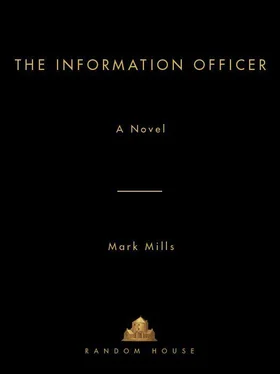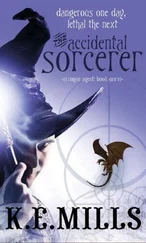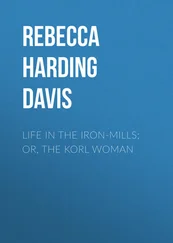Mark Mills - The Information Officer
Здесь есть возможность читать онлайн «Mark Mills - The Information Officer» — ознакомительный отрывок электронной книги совершенно бесплатно, а после прочтения отрывка купить полную версию. В некоторых случаях можно слушать аудио, скачать через торрент в формате fb2 и присутствует краткое содержание. Жанр: Старинная литература, на русском языке. Описание произведения, (предисловие) а так же отзывы посетителей доступны на портале библиотеки ЛибКат.
- Название:The Information Officer
- Автор:
- Жанр:
- Год:неизвестен
- ISBN:нет данных
- Рейтинг книги:5 / 5. Голосов: 1
-
Избранное:Добавить в избранное
- Отзывы:
-
Ваша оценка:
- 100
- 1
- 2
- 3
- 4
- 5
The Information Officer: краткое содержание, описание и аннотация
Предлагаем к чтению аннотацию, описание, краткое содержание или предисловие (зависит от того, что написал сам автор книги «The Information Officer»). Если вы не нашли необходимую информацию о книге — напишите в комментариях, мы постараемся отыскать её.
The Information Officer — читать онлайн ознакомительный отрывок
Ниже представлен текст книги, разбитый по страницам. Система сохранения места последней прочитанной страницы, позволяет с удобством читать онлайн бесплатно книгу «The Information Officer», без необходимости каждый раз заново искать на чём Вы остановились. Поставьте закладку, и сможете в любой момент перейти на страницу, на которой закончили чтение.
Интервал:
Закладка:
“So, Odysseus, how is the fair Calypso?”
“Excuse me?”
“You don’t know the story? It’s from Homer.”
“Pray tell,” said Ralph, eager for revenge.
Legend held that the island of Gozo, just off the north coast, was Ogygia, home to the sea nymph Calypso, who ensnared Odysseus in her web of feminine wiles, holding him hostage for seven years.
It was the first time Max had been ribbed about Lilian, and he wasn’t quite sure how to react. He decided to adopt an air of amused tolerance while they went at him.
“She’s certainly got her claws into him,” said Ralph. “I saw her aunt in the street the other day, and she wanted the lowdown on our friend here.”
“What did you tell her?”
“That he’s an upstanding young man with a fine future ahead of him.”
“It can’t be right to lie to the natives.”
“No, I hear the definite clangor of wedding bells.”
“It’ll mean converting to the Roman Church.”
“Absolutely. They have no truck with our watered-down faith.”
“Well, he could do far worse,” said Freddie. “She’s a beauty.”
“That’s the truth. I’d happily play hide the sausage with her.”
“Ah, but we all know what happens to these Maltese girls when middle age sets in. Suddenly they’re sidestepping through doorways.”
“Less sea nymph than sea cow.”
They talked around him, over him, anything but to him. And as he listened to the imaginary life they were mapping out for him—the meddlesome Maltese relatives, the early-morning masses, his olive-skinned progeny—it dawned on him that Freddie was right: he could do far worse for himself. After all, he almost had.
His thoughts strayed to Lilian, probably in bed by now, just a few streets away, a hop, skip, and jump across the rooftops. He saw her jet-black hair spread across the pillow, and the rise and fall of her breasts beneath the sheet.
Strangely, he had never stopped to think what she really thought of him. What did a kiss in a darkened garden mean to her? Was it loaded with significance? Maybe all she wanted was a pleasing flirtation, a little diversion from the grim realities of life. If so, it was no more than many girls of her social class were looking for. Mdina was home to a number of noble families whose daughters weren’t averse to the odd romantic dalliance. Maybe Lilian was no different. This, after all, was the world she inhabited.
Somehow, he couldn’t see it, though. She was older, too much of her own person to follow the flock simply for the sake of it. He knew immediately that this conclusion flattered him by lending weight to her feelings. It came to him more slowly that they were feelings he was quite happy for her to have.
Or maybe it was the whisky speaking. He had a tendency to turn dewy-eyed under its influence.
Hugh, meanwhile, was growing downright maudlin. He could just as well have been speaking about the burning of the Great Library of Alexandria, so stirring was his account of the destruction by an enemy bomb of the premises of the Malta Amateur Dramatic Club.
No one had been in the building on South Street at the time, but Hugh had been there since and had picked over the rubble, pulling out props and costumes from the plays they’d put on over the years, each one unleashing a memory, many of which he now felt obliged to share with his friends.
The friends, meanwhile, did their best not to laugh. This wasn’t easy, especially when Hugh started to recite lines.
“Do you remember Return to Sender?”
Ralph leaned forward in his chair. “How could we forget, old man?”
This was said for Max and Freddie’s benefit, Hugh being too caught up in the moment to detect the irony.
“‘I say, Margaret, wasn’t that the doorbell? Or could it be that my ears are still ringing from our little contretemps earlier?’”
He gave a smile that said, Step aside, Shakespeare. You’ve had your day .
“Didn’t Olive Bratby play Margaret?” said Freddie.
“She certainly did. And with great authority. Margaret’s not an easy character to play. Remember when her poodle goes missing? That requires a deft touch.”
“Oooo,” said Max, “that’s a horrible moment.”
“It is, it is, and an actress of lesser ability would have over-egged the pudding. Far better, though, that Margaret is seen not to react. She buries the pain away. It’s what she does, you see? As with the poodle, so with life.”
This last line was a tough one to hold out against. They all managed it, though, rising to the challenge of the unspoken game: which one of them would crack first? Freddie, annoyingly, was the master of the poker face and the little glances designed to send you over the edge. Max’s only real chance lay in lighting Ralph’s fuse.
“Maybe I’m wrong, but didn’t I hear that Lord Mountbatten once attended one of your shows?”
“Absolutely. Just before my time, sadly. It was On Approval by Frederick Lonsdale, and he was extremely complimentary.”
Max already knew the story because he had heard it from Ralph, who had heard it from Hugh, who could, apparently, quote by heart from the letter Mountbatten subsequently wrote to the MADC.
He most certainly could. Verbatim.
Ralph had his mouth buried in his glass to hide his smile when Hugh leaned back, staring at the stars, and declared wistfully, “Lord Louis loved us.”
The whisky went everywhere, much of it up Ralph’s nose. The dam then burst for Freddie and Max.
Hugh’s bewildered expression took on a steely edge of realization before softening to one of grudging amusement.
“Bloody Philistines.”
Max was fairly accomplished at riding his motorcycle when drunk, and he knew from his little jaunt with Pemberton and Vitorin Zammit that it was just possible to squeeze three grown men onto the machine. He had never attempted to do both things at the same time.
Fortunately, it was a short trip across the valley to Mtarfa Hospital, where Freddie dismounted and stumbled off in search of his digs. Unfortunately, Hugh was growing more voluble by the minute. As they came down off the ridge onto the plain, he started to recite lines from Tennyson at the top of his lungs while slapping Max on the thigh and exhorting him to go faster.
“‘Forward, the Light Brigade! / Charge for the guns!’ … Faster, faster! …‘Storm’d at with shot and shell, / Boldly they rode and well, / Into the jaws of Death, / Into the mouth of Hell / Rode the six hundred.’”
“Shut up, Hugh.”
“‘Theirs not to make reply, / Theirs not to reason why, / Theirs but to do and die.’”
They didn’t die, although a gaping bomb crater on the outskirts of Attard tried its best to oblige, swallowing them up before spitting them out again.
“Now that’s more like it!” trumpeted Hugh, clinging on for dear life.
On the outskirts of Floriana, they bore left through Pieta and Msida, taking the road that wound its way around Marsamxett Harbour, but as they approached Sliema, Hugh suggested that they carry on past to Fort Tigne’.
“No point in going home just yet,” he called into Max’s ear. “The coven will still be at their cards.”
Fort Tigne’ felt like the end of the known world, stuck out on its promontory at the harbor mouth. To the east lay almost a thousand miles of clear water and the low horizon where the sun rose every morning. It was a wild and lonely spot, and the gun emplacements there had taken a beating in the past few weeks, targeted attacks intended to annihilate them. A visit by a high-ranking officer from Royal Artillery HQ, albeit at such a late hour, was a timely and welcome thing.
Maybe it was the actor in him, but Hugh did a fine job of concealing his waterlogged state from the battery commander, seemingly sobering up at will. His handling of the gunners when he insisted on making a tour of the gun pits was even more impressive. There was nothing remote or routine about his handling of the men. He was relaxed, familiar, and amusing.
Читать дальшеИнтервал:
Закладка:
Похожие книги на «The Information Officer»
Представляем Вашему вниманию похожие книги на «The Information Officer» списком для выбора. Мы отобрали схожую по названию и смыслу литературу в надежде предоставить читателям больше вариантов отыскать новые, интересные, ещё непрочитанные произведения.
Обсуждение, отзывы о книге «The Information Officer» и просто собственные мнения читателей. Оставьте ваши комментарии, напишите, что Вы думаете о произведении, его смысле или главных героях. Укажите что конкретно понравилось, а что нет, и почему Вы так считаете.










